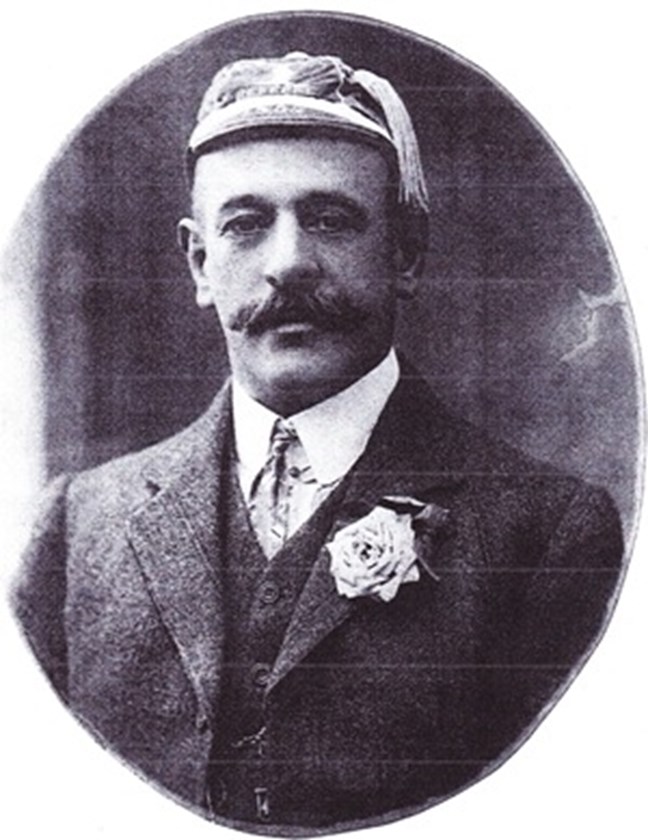The founding father of rugby league referees in Australia was such an honest soul he successfully instituted a system where match officials not only would not be paid, but they would make a donation for each game they controlled.
In 1907, Edward James "Ted" Hooper led a small group of eight men to become the first of Australia's whistleblowers for the burgeoning sport.
Born in 1871 in Kent, England, Edward showed great aptitude for sports and fitness at a very young age. He moved to Australia and almost immediately found work with the Randwick Municipal Council, as manager of the surf pavilion at Clovelly beach.
He began playing Rugby Union, initially as a centre. At the ripe age of just 27 he made his first-grade debut for Surry Hills, played for them from 1899 until 1902. In 1903 he moved to Easts and also, into the second row, where he became renowned as one of the smartest forwards in the state.
In 1903 he was selected in a state squad that toured the Northern Rivers, before playing an official game for NSW alongside future rugby league pioneer Arthur Hennessy. In 1903 Hooper also won his maiden first-grade premiership. He left the Easts club the following year and joined Sydney for the 1905 season before announcing his retirement.

Hooper turned his hand to refereeing and in late 1907, when discontent among the rugby ranks and talk of a breakaway code grew stronger, Hooper decided he would switch to this exciting new game.
On August 28, 1907, he was appointed the inaugural Rugby League Referees' Association president, a role he held until the end of 1912.
The NSWRFL offered to pay the referees and sideline officials a small sum of money for officiating games.
Hooper however moved that the referees not be paid, so the money could be used elsewhere to ensure the survival of the game. The referees also decided they would also donate money to the NSWRFL from their own pockets. A ref would donate threepence and the sideline officials gave a shilling each for every game they controlled.
On April 20, 1908, when Easts and Newtown kicked off in the first rugby league game under Northern Union rules at Wentworth Park, Hooper was the referee as Easts won 32-16.
On May 2, 1908 Ted then became the first to referee a representative game in Australasia, when he officiated the touring New Zealand team's clash with NSW.
Hooper typified the fitness required to referee rugby league – on July 4, 1908, he controlled two consecutive games on the same day. The Newtown vs Norths game which kicked off at 2pm, followed by the Balmain vs Glebe game at 3.15pm.
After he stood down from president of the referees' association at the end of 1912, he was selected to manage a NSW squad to New Zealand, however it was essentially an unofficial Australian squad.
The tour started with two easy wins for the Blues. In the second game, Sid Deane was charged with an illegal strike on an opponent and the NZRFL suspended him for the remainder of the tour. The NSW team threatened to strike, but Hooper stepped in and mediated a lesser suspension for Deane which ensured the tour would continue.
The controversy didn't end there. Hawkes Bay were to host NSW on a Saturday at the same ground the NZRU was due to use the next day. League officials asked to use the newly erected stand that the NZRU assembled at the ground. The Union officials agreed but only if the NZRL and NSWRL would pay an exorbitant price. They declined.
On the eve of the league game, Union officials dismantled the stand and took all the materials with them. When the rugby league officials arrived at the ground the next morning, Hooper and the NSW and Hawkes Bay players, as well as local residents, chipped in with materials and labour to build their own stand, which was completed in time for the game.
The NSWRFL opted not to charge anyone admission for the game for their support and after a great match many of the fans donated money to match officials. Hooper gave half the money to the NZRFL.
The NSW team lost to Auckland before defeating New Zealand's Test side. NSW went on to finish the tour with eight wins from their 10 games. So successful was the tour financially, that the NSWRL decided to do it again the following year.
Hooper toured again to New Zealand in 1913 with Souths secretary SG Ball named as his co-manager.
The tour was another roaring success, with achievements made that have never been matched. NSW generally annihilated their opponents with their most impressive performance in the last tour game against New Zealand's Test team which they won 58-19 over the Kiwis.
Hooper was coerced into another notable first in 1914 when he managed the NSW team in a game against the touring British Lions, the first game played in Victoria. Around 12,000 fans turned out to see England win 21-15.
The NSWRFL disbanded the Referees Association in 1915, meaning the game's controlling body now organised the officials for each game. Hooper was immediately appointed as a referee selector, a position he held until 1925.
In 1925, he travelled with the NSW team to Brisbane for the fourth interstate game. At half-time, a novelty game between the Brisbane and Ipswich referees was scheduled, with Hooper as the honorary referee. Once the 15-minute game ended, the refs left the field with the crowd applauding Hooper, who waved and smiled as he entered the change rooms.
He went to the shower and collapsed on the floor.
Doctors ran in but they were too late. Hooper had died, aged 54.



